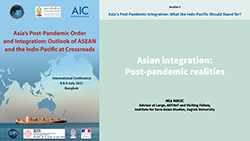Asian integration: Post-pandemic realities / Mia MIKIC
Asia’s Post-Pandemic Order and Integration: Outlook of ASEAN and the Indo-Pacific at Crossroads
 Asian integration : Post-pandemic realities
Asian integration : Post-pandemic realities
Mia MIKIC, Advisor at Large, ARTNeT and Visiting Fellow, Institute for Euro-Asian Studies, Zagreb University
Before the global pandemic, there were several challenges to the Asian trade environment – globalization, weakened multilateral trade regime, diverse participation of Asian economies in the Factory of Asia and sharply increased uncertainty primarily due to trade tensions between the US and China. The pandemic-driven disruptions of supply chains, reduction of economic activity, FDI, trade, etc., added to the already existing angst from globalization and things/people “foreign,” raising a level of distrust among governments that needed to work together in the context of fighting the global pandemic. Looking into the post-pandemic future of Asian economic integration requires assessing the following dimensions : trade, FDI, equity, migration, tourism with a view of identifying the key factors which hinder integration, especially from a perspective of diversifying value chains and establishing production networks in the region and the needs of sustainable recovery and development. Are the two obvious paths (RCEP and CPTPP) with their opportunities to include new members sufficient to deal with the obstacles ? Additionally, and importantly, the role of re-building trust in regional and multilateral cooperation will be discussed, especially with the embrace of competitive interdependence approaches from both the US and the EU. Would adopting a symbiotic interdependence in Asia be an advantage ?
Session 5 / Asia’s Post-Pandemic Integration : What the Indo-Pacific Should Stand for ?
Chair : Prof. Suthiphand CHIRATHIVAT, Chulalongkorn University, Bangkok
The session will present and discuss challenging times of Asian integration caused by erosion of global economic order, lingering pandemic crisis and possible recovery, unpredictable trade frictions of major powers, and upcoming regionwide trade agreements of RCEP and CPTPP. The Indo-Pacific has added another dimensions to regional integration, with possible alliances and new ways/models for reimagining trade, investment, technology, and regional value chains. This session will deal with what this changing environment is meant for Asia, Asian integration and, in particular, ASEAN, in terms of policy preparedness and adjustment to be implemented.
—
“Asia’s Post-Pandemic Order and Integration : Outlook of ASEAN and the Indo-Pacific at Crossroads” is an international conference organized by The Research Institute on Contemporary Southeast Asia (IRASEC-CNRS) with the ASEAN Studies Center (Chulalongkorn University) in Bangkok, and the ASEAN-India Centre (AIC), RIS in New Delhi.
8-9 July 2021 - Chulalongkorn University, Bangkok











